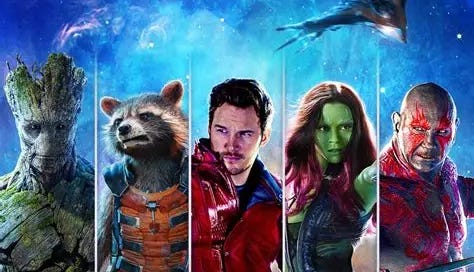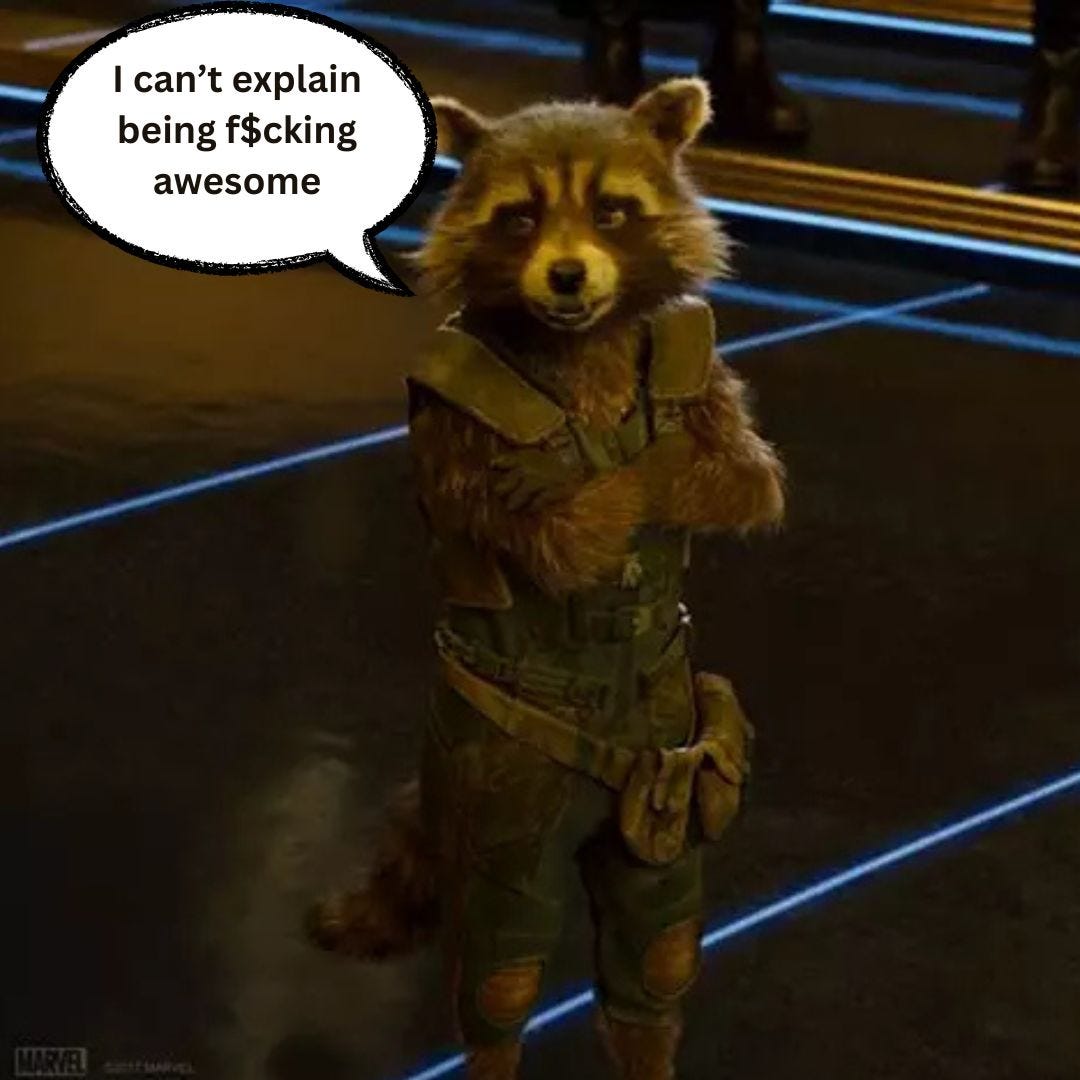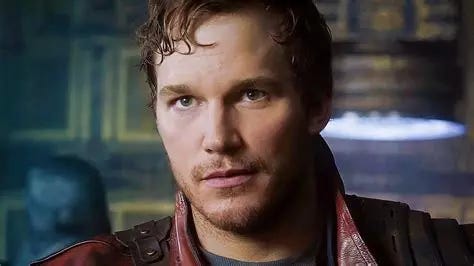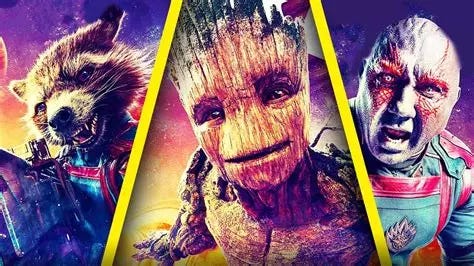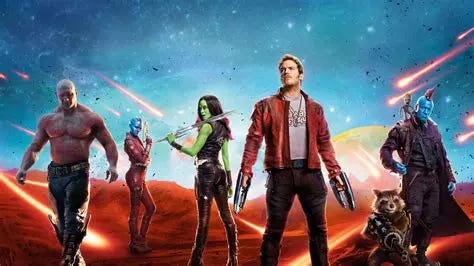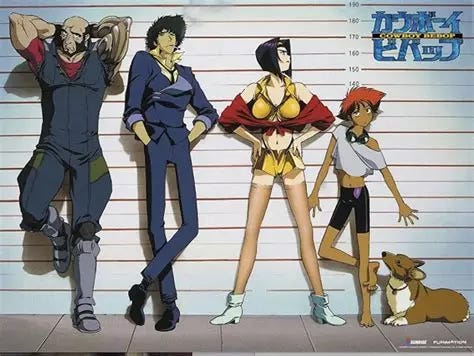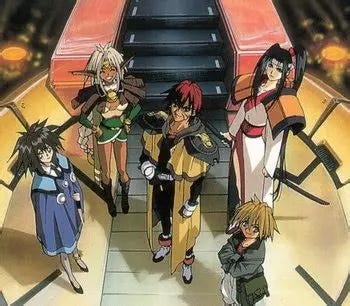Although this isn’t a film I would normally give an introspective analysis of, I still feel compelled to write about it because if I could simplify my own intellectual feelings towards it, is that it is simply a great fucking film. I realize that I’m stating something that a decade since its 2014 release has made the blatant obvious, but the tragic element of watching a film as good as James Gunn’s first chapter into the Guardian’s Of The Galaxy trilogy is that it reminds this humble viewer/critic of a time when the Marvel Cinematic Universe (MCU) had a soul. Having not seen the 3rd volume, most of the criticisms I’ve heard have been nothing short of praise, or overall positive acceptance, which is in diametric opposition to the more common reactions or feelings a majority of fans and modern audiences have towards most of the marvel-centric media that is released today.
The fact that Guardians Of The Galaxy Volume 3 has earned YouTube analysis video titles such as “Why Guardians of the Galaxy 3 is the BEST MCU Movie of All Time” or “Guardians of the Galaxy Vol. 3 is NOT an MCU Movie” illustrates the artistic craftsmanship of James Gunn as a filmmaker regardless of the trajectory Marvel has failed to avoid. It also showcases the mild frustration fans of the MCU are subtly expressing through this display of gratitude. This is only warranted by the lack luster manner in which recent films in the Marvel Cinematic Universe have been performing, to a point where even the revival series Dare Devil Born Again has earned the kind of semi-pessimistic anticipation from fans who instead of expressing outright negativity, which is much warranted after seeing the character in such a butchered fashion within She-Hulk: Attorney at Law (Haven’t seen the show, but enough DD clips to form healthy pessimism), are still saying things like “Please don’t fuck this up.” This type of pessimism is well warranted, and a massive contributor to the more appreciative and acclaimed reception Guardian’s 3 has earned in its ability to remember that aside from being a comic book film, it is still at the core, a film, something it’s director understood, as should every other auteur indie director Disney likes to take into a dark room and creatively castrate into making something that is more corporately tolerable.
Why Guardian’s Is Special?
So here comes the billion dollar question, what makes the first Guardians Of The Galaxy special? The infusion of 70’s and 80’s pop music sensations like Redbone, Marvin Gaye, David Bowie all succeed in adding color to the film, and it’s no secret of how much music plays a big role in cinema, whether it’s the tone conveyed through the implementation of specific music, or the choice of a song at a particular time for a particular character. But those mentioned elements are only one part of the equation, and luckily, it has a good start in infusing itself into the narrative so well that not only does it add a sense of adventure to the characters, but it even speaks to the deeper wounds many of them are suffering from. The one that comes to mind in this regard is that of the quintessential leader of the Guardians, Peter Quill (Christ Pratt) a.k.a. Starlord.
The Legendary Outlaw Star Lord
Although for the most part being presented as the quintessential renegade bad boy with a reckless danger loving streak, the wounds that Peter hides are clearly shown through his propensity to drown himself in music that can range from something as melancholically somber and even nurturing as 10c’s “I’m not in love” or bombastically liberating as Redbone’s “Come And Get Your Love.” The combination of the emotional differentiation that these songs convey is clear and concise in showing how deep the wounds in Peter are. The opening scene of a young infant Peter having to witness his mother die of cancer could’ve gone wrong in so many other films given that it’s been an emotional manipulation tactic other stories have used to invoke sympathy within an audience for a character that wasn’t meant to have depth, complexity, and even sometimes likability (How can you fuck that up?). But introducing Peter by having him listen to music as a way of tuning out from the harsh reality he is in, even as his grandfather tells him that his dying mother wants to see him is perfect in illustrating the depth of his character, who despite his brazen go getter hunger for adventure and his anarchic sprit, he is still a little boy crying out for the mother he lost at an early age and ran away from as a result of an inability to face the reality of losing her.
The Rest Of The Guardians
What’s been said about Peter Quill can also be said for the rest of the Guardians. Each of them in a sense is running. Gamora (Zoe Saldaña), the stoically resilient heroine member of the Guardians is the adopted daughter of the mad titan Thanos (Josh Brolin). But instead of demonstrating loyalty to the galactic snapper, Gamora wishes to see the same infinity stone he and his underling Ronan The Accuser (Lee Pace) wish to acquire, before even knowing what it is in order to sell it for enough money to disappear and get away from the trauma of a past we learn in Avenger’s Infinity War was beyond what any child could call normal. Drax the destoryer (Dave Bautista) is driven by a desire for revenge against Ronan, who as part of his religious fanaticism murdered his wife and daughter. This trauma results in him being bombastically stubborn, and impulsively reckless when it comes to combat or trusting people he works with, that being the guardians. Last on the list of outcasts is that of Rocket (Bradley Cooper) and Groot (Vin Diesel), a talking space raccoon who claims he’s not a raccoon, and a humanoid tree who can only verbally express himself by saying “I am Groot.” They too, through their own tragic circumstances are making up for the better part of their lives being stolen from them, or as Rocket openly voices in a short but still emotionally significant drunken rant, "I didn't ask to be taken apart and put back together over and over…"
Regardless of which Guardian the film takes the time to highlight in its variety, it never shies away from illustrating the value and importance of the pain they are either hiding or actively trying to run away from. The gathering of them because of a mysterious orb containing one of the six immensely powerful infinity stones is the inciting incident of each of their journeys, and once witnessing the depths of its destructive power, it all becomes clear to them that there is no running away from a force that wants nothing more than to bathe and welcome the kind of destruction that is never about peace and only dominated by the pain of their past. Ronan The Accuser is such a character.
Ronan The Accuser: More Than Just A MCU Plot Device Villain
Although Ronan is at first presented as a religious theocrat who abhors the idea of his people, the Kree empire signing a peace treaty with the people of Xandar, who he claims have in the past slaughtered his people, there is a purpose for making him an antagonistic force within this film, rather than just denoting him to an enemy to unite the Guardians, which has been the basis for many, if not a majority of the MCU’s villains. Granted, this doesn’t add as much dimension to Ronan as a viewer would like. However, the benefit that Ronan serves, in addition to being an antagonist to the narrative of the film is that he also embodies the same character flaw that each of the Guardians have, and that is the pain that they are holding onto, as opposed to recognizing the bigger picture that exists outside of it. James Gunn’s colorful take on the space crusaders of justice is intriguing not only in the spectacular aesthetic his direction conveys, along with the energetically colorful use of music. But the humanity he finds in these characters the average marvel fan probably wouldn’t have thought about more than a decade ago since the film’s 2014 release, is a testament to his work as an artist for a telling a story about a band of rejects not only putting aside their differences to save the lives of millions, but even acknowledging the vulnerability that they have been running away from.
Final Thoughts
Guardians Of The Galaxy’s story isn’t a new story. It’s a narrative structure that has been approached by many other artists. Whether it’s Shinchiro Wantabe’s Cowboy Bebop or Takehiko Itō’s Outlaw Star, the concept of a team of outcasts cruising the universe while avoiding their past has been used throughout multiple stories. But what makes this a truly special narrative approach is it’s power to remind us of the humanity that must never be forgotten, even if the same world said heroes are fighting for is more than willing to.
No Fancy Quote This Time. I’ll leave that to the talking Raccoon.
If You wish to support me and the work I do, then feel free to donate what you can. Even a dollar restores my faith in humanity.
Bitcoin
bc1qmmwpt4jytdjqr0duahlrvnvyaxh8avymvgjzk7
Monero
89UPRSB1xRyFMUAXiAxr8TdpPKviKrDCZ2MYy1eSB6iHi82VDZoHZ8E5HR5RuZnoxSTYWuwrJ7jSe5VNVeBR76haJCghkdY
https://www.paypal.me/Vincentmurdock666
Affiliates
CashApp:
https://cash.app/$AndresIBenatar
https://cash.app/refer/P2DWNDH
ProtonVPN
https://pr.tn/ref/E8CMM7ETZZ9G
Swan Bitcoin
https://www.swanbitcoin.com/ViciousTheDevil
Fetch
https://referral.fetch.com/vvv3/referralsocial?code=3E1F4Y
Strike
https://invite.strike.me/IXEWYK
Ag1
Better Help:
https://www.betterhelp.com/rpc/59dbaa0a1e0d9bbc-5-01?utm_term=ref_v2_dd

